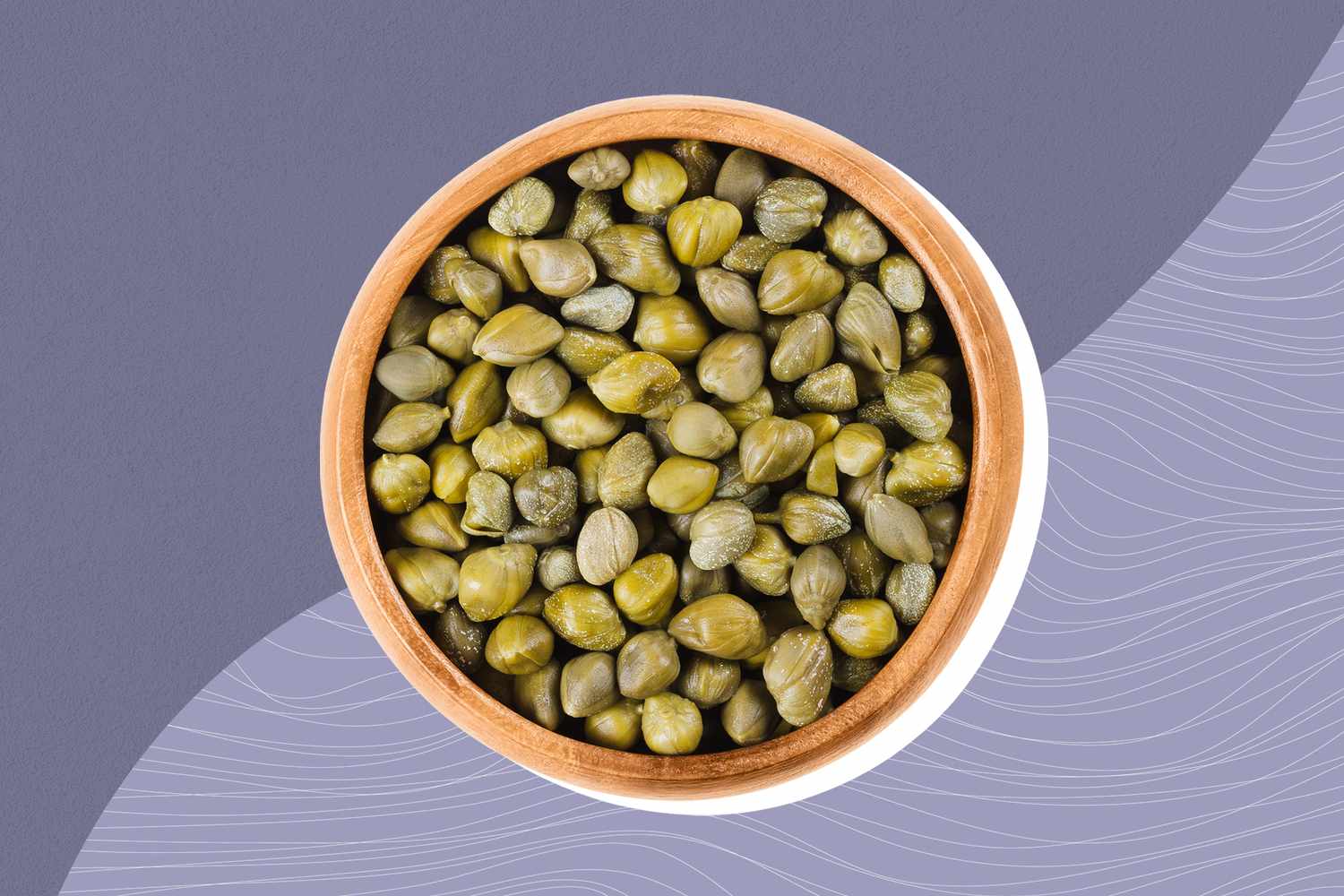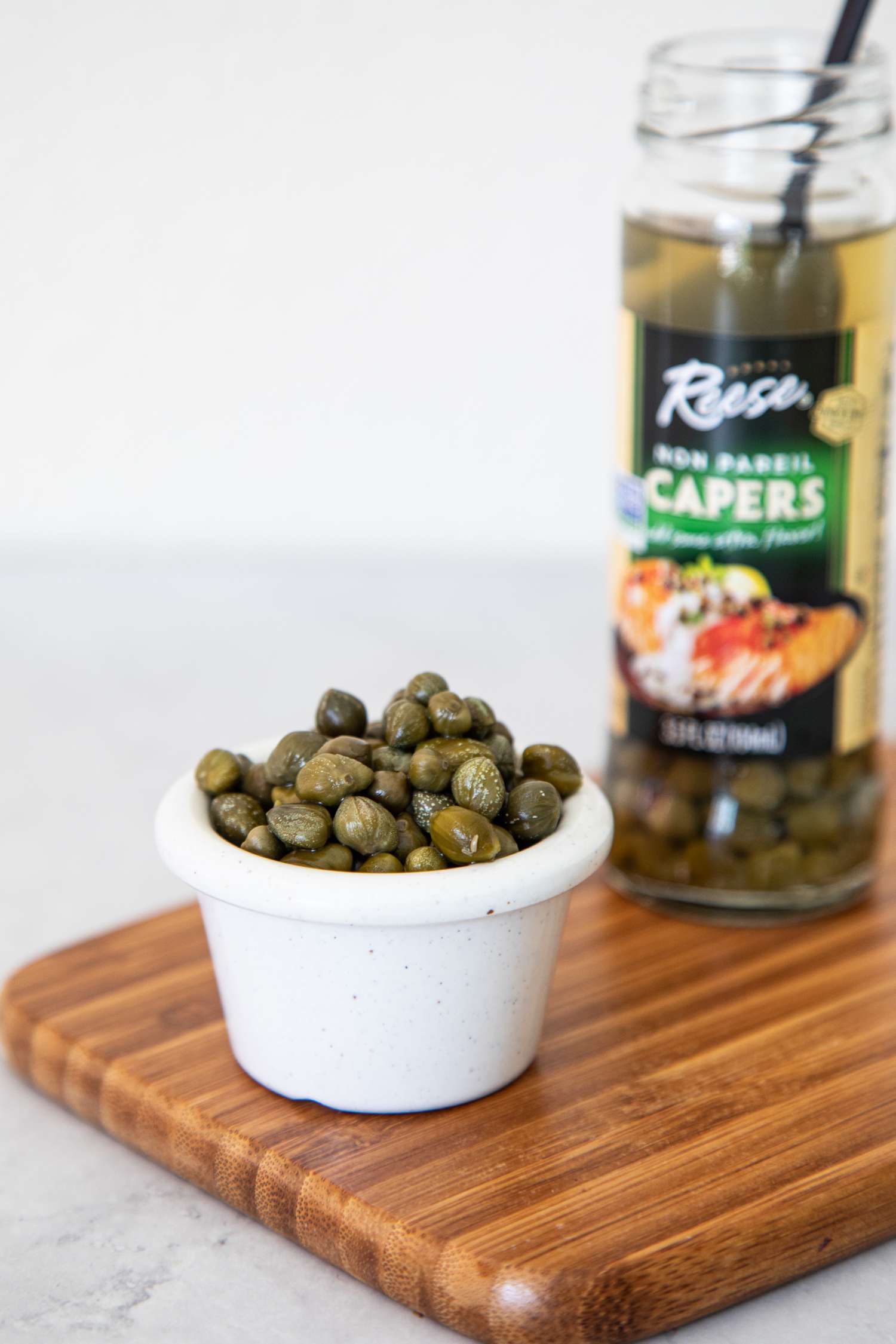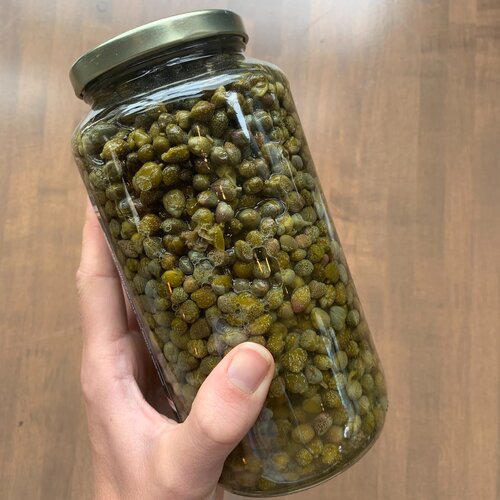
Introduction To Capers
What Are Capers?
Capers are small pickled flower buds that come from the caper bush (Capparis spinosa). They are commonly used as a seasoning or garnish due to their unique flavor profile. The tiny buds are renowned for their tangy and briny taste, which distinguishes them from other ingredients. This tanginess is a direct result of the curing process involved in their preparation.
Caper Buds Growing On A Bush
When left to mature, caper buds eventually bloom into delicate white or pink flowers that add to the charm of the caper bush. These buds are harvested before they bloom to preserve their optimal flavor and texture. The process of pickling or curing the buds in a brine solution further enhances their piquant taste, making them a favorite choice in various culinary dishes.
So, next time one is in the kitchen, reaching for a jar of capers can truly elevate the taste of the dish with their distinctive tangy flavor.
Understanding The Distinct Flavor Profile Of Capers
What Do Capers Taste Like?
Capers have a unique taste that combines tangy, briny, and slightly floral notes. They are often compared to green olives but with a sharper tanginess. The salty and savory undertones of capers come from the curing process they undergo, involving drying, brining, or packing in salt. This preparation method gives capers their distinct flavor profile that is beloved in various culinary dishes.
The Curing Process Imparts A Sublime Salinity With Notes Of Mustard
Instead of being pickled like many other vegetables, capers are cured through a process of drying and brining or sometimes packing in salt. This unique method of preservation not only enhances the tangy and briny flavor of capers but also imparts a subtle salinity with hints of mustard. The result is a versatile ingredient that can add depth and complexity to salads, sauces, meats, and seafood dishes.
The Tanginess Of Capers
Capers’ Tangy Taste
Capers boast a distinctive taste profile that blends tangy, briny, and slightly floral elements. Often likened to green olives but with a more pronounced tang, capers derive their salty and savory undertones from a curing process involving drying, brining, or salting. This meticulous preparation method imbues capers with a unique flavor cherished in culinary creations.
Tangy And Briny Flavor Of Capers
Unlike conventional pickling methods, capers undergo a curing process that encompasses drying, brining, or salt packing. This unconventional preservation technique not only accentuates capers’ tangy and briny essence but also introduces a delicate salinity with nuances of mustard. The outcome is a versatile ingredient capable of enriching the complexity and depth of salads, sauces, meats, and seafood dishes.
The Tanginess Of Capers
Capers’ Tangy Taste
Capers have a taste profile that combines tangy, briny, and slightly floral notes. They are often compared to green olives but with a more distinct tanginess. The curing process of capers, which involves drying, brining, or salting, leads to their salty and savory undertones. This meticulous preparation method gives capers a unique flavor that is highly valued in the culinary world.
Tangy And Briny Flavor Of Capers
Unlike traditional pickling methods, capers go through a curing process that includes drying, brining, or salt packing. This unconventional preservation technique not only enhances the tangy and briny nature of capers but also introduces a subtle saltiness with hints of mustard. The end result is a versatile ingredient that can elevate the complexity and richness of salads, sauces, meats, and seafood dishes.
The Brininess Of Capers
The Briny Flavor Of Capers
The brininess of capers is a defining characteristic that contributes to their unique taste profile. Through the curing process, capers absorb the flavors of the brine, adding a depth of flavor that complements their tanginess. This brininess enhances the overall taste experience when capers are used in various culinary applications.
Capers’ Pronounced Brininess
Capers are distinguished by their pronounced brininess, which sets them apart from other ingredients. This significant briny flavor comes from the curing process, where capers are exposed to brine solutions that enhance their taste. The pronounced brininess of capers adds complexity and a savory element to dishes, making them a valuable addition to the culinary world.

Culinary Uses Of Capers
How To Use Capers In Dishes
Capersoffer a unique flavor profile that combines tangy, briny, and slightly floral notes, making them a versatile ingredient in various dishes. They can be used to enhance the taste of salads, pasta sauces, meat dishes, and seafood recipes. Incorporating capers can add a delightful tanginess and depth of flavor to your culinary creations.
Incorporating Capers’ Tangy And Briny Taste In Recipes
The briny and tangy flavors of capers can be incorporated into recipes by adding them to vinaigrettes for salads, sprinkling them over roasted vegetables, mixing them into pasta sauces, or using them as a garnish for fish dishes. Their unique taste can elevate the overall flavor profile of a dish, providing a balance of salty, tangy, and savory notes that complement various ingredients.
History And Origins Of Capers
Capers In European And Middle Eastern Cuisine
Capers have a rich history in European and Middle Eastern cuisines, where they have been used for centuries to add flavor and complexity to dishes. Their briny and tangy taste profiles make them a popular ingredient in Mediterranean and Italian cooking, where they are often featured in pasta sauces, salads, and seafood dishes. In Middle Eastern cuisine, capers are used to enhance the flavors of traditional dishes, adding a unique twist to meals.
Capers’ Use As Medicine By The Ancient Greeks
In addition to their culinary uses, capers have also been valued for their medicinal properties throughout history. The Ancient Greeks used capers as a natural remedy for various ailments, believing in their therapeutic benefits. Capers were believed to have antioxidant properties and were used to treat conditions such as inflammation and digestive issues. The tradition of using capers for their potential health benefits has persisted over the centuries, contributing to their reputation as a versatile and valuable ingredient.
Health Benefits Of Capers
Nutritional Value Of Capers
Capers, the flower buds of the caper bush known as Capparis spinosa, have a rich nutritional profile. They are low in calories but pack a punch in terms of flavor and health benefits. Capers are a good source of antioxidants, which help to combat oxidative stress in the body. They also contain vitamins and minerals such as vitamin K, vitamin C, iron, and calcium, contributing to overall health and well-being.
Potential Health Benefits Of Consuming Capers
Consuming capers can offer a range of potential health benefits due to their unique composition. The antioxidants present in capers may help reduce inflammation in the body, potentially lowering the risk of chronic diseases. Additionally, capers are believed to have heart-protective effects, supporting cardiovascular health. The presence of certain compounds in capers may also aid in digestive health, promoting gut function and overall digestion. With their tangy flavor and versatile uses in various cuisines, capers can be a valuable addition to a balanced and healthy diet.

Conclusion
Summarizing The Tangy And Briny Delights Of Capers
Capers, the flower buds of the caper bush, offer a unique flavor profile characterized by tanginess, saltiness, and slight bitterness with a hint of sharpness. This distinctive taste is a result of the curing process, where caper buds are pickled in brine or packed in salt. The interplay of compounds like mustard oil glucosinolates contributes to the piquant flavor that sets capers apart.
Exploring The Versatility Of Capers In Cooking
Apart from their bold flavor, capers also provide a range of potential health benefits. Rich in antioxidants, vitamins, and minerals such as vitamin K, vitamin C, iron, and calcium, capers can help combat oxidative stress, reduce inflammation, support cardiovascular health, and promote digestive well-being. With their tangy taste and nutritional value, capers can be a valuable addition to a balanced and healthy diet, enhancing the flavor and health benefits of various dishes.
Frequently Asked Questions
Common Queries About Capers Answered
Capers, known for their tangy and briny flavor, are actually small pickled flower buds obtained from the caper bush. These buds contribute a unique taste profile with hints of sourness, saltiness, and a touch of bitterness. The process involves pickling the buds in brine or salt, which imparts the distinctive flavor capers are known for.
Insightful Information On Capers And Their Taste Profile
Furthermore, capers offer more than just flavor enhancement in dishes. They are rich in antioxidants, vitamins such as vitamin K and C, as well as essential minerals like iron and calcium. These nutrients play a vital role in combating oxidative stress, reducing inflammation, supporting heart health, and improving digestive function. Incorporating capers into meals not only adds a tangy kick but also boosts the nutritional value of the dish, making them a versatile and beneficial ingredient to have in the kitchen.
FAQ About Capers Taste
Q: What are capers?
A: Capers are small, green buds that are commonly used as a seasoning or garnish in cooking.
Q: What is the taste of capers?
A: Capers have a unique tangy and slightly salty flavor profile. Some describe it as briny or lemony.
Q: How should capers be used in cooking?
A: Capers can be used in a variety of dishes such as salads, pasta, sauces, and seafood to add a pop of flavor.
Q: Are capers good for your health?
A: Capers are low in calories and rich in antioxidants, vitamins, and minerals, making them a healthy addition to your diet in moderation.
Q: Can capers be substituted with anything else?
A: Olives or pickles can be used as substitutes for capers in recipes if you don’t have them on hand.
Q: Are capers suitable for all types of diets?
A: Capers are generally suitable for vegan, vegetarian, and gluten-free diets, but it’s always best to check the label for any additives or allergens.

Gourmet Tiger, a culinary sensation, was established with a vision to delight taste buds and create unforgettable dining experiences. Specializing in cakes, casseroles, lunch, catering, and more, Gourmet Tiger has become a household name synonymous with exquisite flavors and impeccable service. Since its inception, Gourmet Tiger has been dedicated to crafting delectable treats and savory dishes that exceed expectations. Their commitment to using only the finest ingredients and innovative culinary techniques has set them apart as a leader in the food industry.